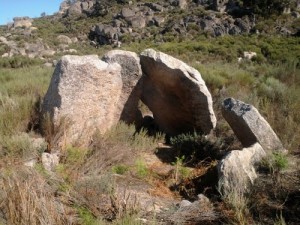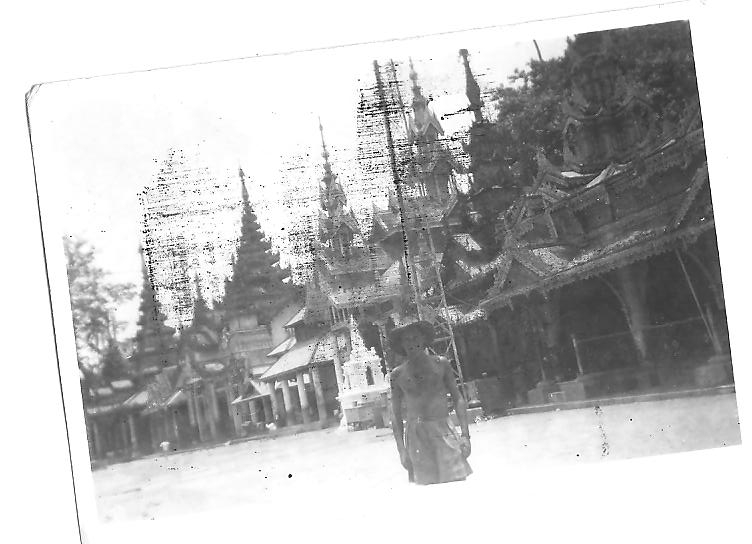“What is a Dolmen?”
By Richard Salzberg ©2013
“It was crazy,” he was saying. “You know, we hadn’t seen each other in, like, 25 years. And yet, honestly, in a way, I felt closer to him as a friend than with a hundred friendships that have come and gone during the same time.”
“Really?”
“Yeah.”
“Why do you think that is?”
“I don’t know.” He moved his chair closer to the table. “I guess because of the distance. ‘The safety of distance.’ He’s in Spain and I haven’t been back there in all that time. Too long . . .”
“I thought you said he was English.”
“He is. Or was . . . but I guess you’re always English, right? Anyway, he’s lived in Spain for about 40 years. He was one of the young wanderers who went to Spain looking for ‘adventure and whatever comes our way.’ Then he fell in love and married a pretty señorita. They raised a beautiful little family there, and he’s done alright for himself as a trader and translator.”
“That’s how you met, right?”
“Right, he was a translator for some wildly aspirational stuff we were trying with some Spaniards a hundred years ago.” He quickly braked the musing. “Anyway . . . Michael’s a very clever cat. And when we finally get together to reconnect, it’s at a bar in a hotel in Lisbon.’
“That’s cool.”
“And then we spent a lot of the time discussing the dolmen he’s got on what he refers to as ‘his wife’s family’s property.’ ”
“Where’s that?”
“They have a finca – ”
“– what’s that?”
“It’s a place in the country. They call it “El Palancar.” Very rugged, beautiful land about seven miles from the Portuguese border, near the town of Valencia de Alcántara. From their land you can see an ancient Portuguese mountain village called Marvão.”
“So you finally got together and discussed a what – a dolmen – ?”
“Yeah.” He paused before deciding not to try to explain. “Yeah . . . it was really good to see him again.”
“I can imagine. And you said he knows a lot about American culture.”
“Yeah. Yeah, he’s very big on American politics and jazz. And track. He knows all about American track, for Christ’s sake.” He laughed, “Do you?”
“Sure. Everything.”
“Exactly. But track is a big thing over there, and he used to be a runner. He’s also a Class-A bird watcher, mostly in the wild, and a hell of a photographer. Anyway . . . we finally get together in person after so long, and it was really good. I really believe that by continuing to communicate over the years, first by mail and an occasional phone call, then by e-mail of course . . .’
“Of course. And now Skype.”
“Of course! After having met years ago as a couple of hopeful young guys . . . I don’t know . . . it was like we sort of kept each other young.”
“Yeah, right,” he laughed.
“Okay, maybe that’s overstating it. But really, there’s something slightly metaphysical about it.”
“That’s a good word.”
“Yeah.”
“So you were going to tell me something about World War II.”
“Ah, yes . . .” He absently wiped away a small ring of condensation left by his glass with the square bar napkin. “Well, it’s maybe not so much about the war as it is a thing about . . . I don’t know . . . like a general sort of eternal thing between sons and fathers.”
“Oh, great . . .”
“I know, I know . . . I’d just written a short thing about a book I read, “The Burma Road” [www.facebook.com/highbridgepublications] by Donovan Webster. It’s all about – ”
“– the Burma Road!”
“Brilliant!” He smiled and finished his drink. “Anyway . . . I remembered that Michael’s father had served in Asia with the Brits during the war, and . . .”
“You remembered that – ?”
“Well, yeah . . . in 25 years of dialogue you can cover a lot of ground. He had e-mailed me an old photo of his Dad looking like a lean British cowboy standing in front of some ancient stone temples somewhere in Southeast Asia.”
“That’s weird.”

“Well . . . after all – what ain’t?”
“You’re right there.”
“Anyway . . . I’d been reading about all this terrible grueling stuff along the Burma Road, and the Ledo Road – all along ‘700 miles of World War II’s longest active battlefront’ – all about Orde Wingate and – ”
“ – who?”
“Look him up . . . so I’m reading about how Orde Wingate created this outfit that became these incredible bad-ass British jungle fighters who kicked Japanese ass all over hundreds of miles of the most lethal sort of terrain around Burma, Thailand, China, and India. They were driven to get even for Singapore, and Hong Kong, and everywhere else they had folded, right? And I remember this crazy sepia photo of Michael’s Dad, and when I see him I ask if by some chance the old man had been with the Chindits.”
“With who – ?”
“The Chindits. That’s what these British guys were called. Chindits.”
“What does it mean?”
“Look it up.”
“Okay, professor . . . so what about his father?”
“Here’s what he told me,” he said, unfolding a piece of paper from his pocket.
“You wrote it down – ?”
“I try to write down everything I should remember.”
“Good idea. Practical, too.”
“So in this very short thing about the book I used the line: ‘Do talk to our fathers when we can,’ and what Michael said about his old man was important. I mean here we are in a bar in Lisbon after 25 years, and we’re trying to still feel (and act) like young men . . . but our fathers were in a war already relegated to history books.”
“And the History Channel.”
“Right.”
“And they were younger then than anybody could ever remember.”
“Especially themselves.”
“So what did your friend say?”
“Wait a minute,” he looked around the room.
“What?”
“I need another drink.”
“Oh, man . . .”
He got the waitress’s attention and ordered another drink. “It’ll be worth it.” When it arrived he thanked the woman and took a sip. “That’s better,” he said, looking at the paper again. “Now then . . .”
“Did your friend Michael see you write this down?”
“I guess so.”
“What did he think?”
“Who knows?” He took another taste of his drink. “Do you want to hear what he had to say about his father, or not?”
“I’m still waiting.”
He began to read from the paper: “My dad was in a regiment called the Royal Signals. All I know is that he knew Morse code and saw action in Burma and went back to India to Poona, I think, in between battles. Didn’t tell us much more except for that occasion when he told me about having to use flame-throwers to flush Japanese out from a bunker. He went to India (via South Africa) when my mother was expecting their first child, my eldest sister Jean (still going strong), and he didn’t actually see her until she was three, only in photos. All letters were censored (my mother kept them all) and I’ve seen some, but there’s no indication of where they were, what they were doing, ‘nowt at all,’ as we say in Yorkshire. I think he could drive a tank, but once back in Britain he never had a car. He always went to work (textile factory) on his bicycle.”
“Whoa . . .”
“Exactly.”
“I think I need another drink now,” he said, signaling the waitress.
“Go ahead.”
“I just have one question . . .’
“Shoot.”
“What is a dolmen?”
_________________________________________________
See:
1] http://www.worldwar2history.info/Burma/Road.html
2] http://en.wikipedia.org/wiki/Chindits
3] http://www.nationalww2museum.org/see-hear/collections/focus-on/merrill.html
4] http://www.newworldencyclopedia.org/entry/Dolmen

